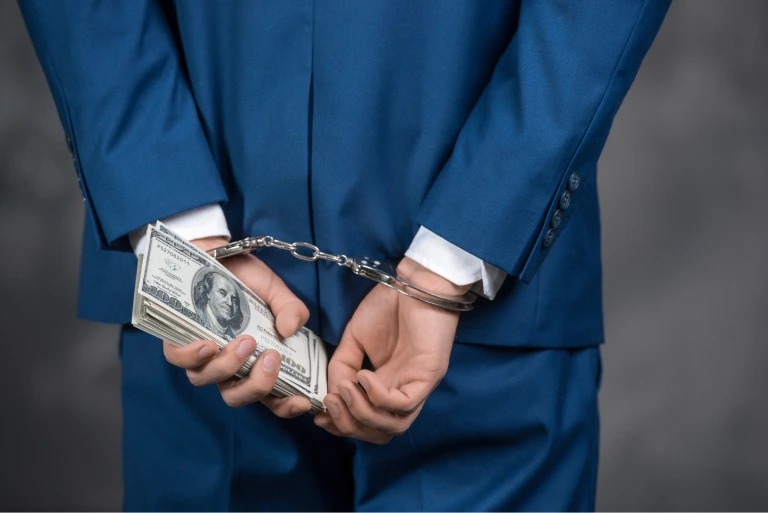
Are you facing charges related to white-collar crime in San Antonio, TX? It’s essential to have a legal team with the expertise and experience to handle these intricate matters. Ernest Acevedo Law Group is here to provide the necessary legal assistance. Call us at 201-226-5656 for immediate support from a seasoned San Antonio white-collar crimes lawyer.
Understanding the high stakes of white-collar crime cases, Ernest Acevedo Law Group is equipped with the necessary resources, knowledge, and skills to defend you in these complex legal battles. Our San Antonio law firm is committed to protecting your future and fighting vigorously against the serious charges you face.
Prompt legal representation is crucial in white-collar crime cases. The sooner you get in touch with us, the better we can prepare a robust defense strategy, reducing the risk of a conviction. Contact Ernest Acevedo Law Group’s office in San Antonio, TX, to schedule a free consultation today. Our team is ready to support and guide you through this challenging time with our expertise and dedicated approach.
How Our San Antonio, TX Criminal Defense Lawyer Can Help When You Are Charged With a White Collar Crime

Facing a white collar crime charge is an unnerving experience. The stakes are high, and the consequences can be devastating, both personally and professionally. Our proficient San Antonio white collar criminal defense lawyer will work tirelessly to uphold your rights and strive for the best possible outcome for your case.
Our skilled attorney will review the evidence, assess the charges, and conduct a thorough investigation into the allegations. Our familiarity with the intricate facets of criminal law equips us with aggressive defense strategies, guiding you through the legal maze. We take charge of liaising with local law enforcement agencies, government bodies, and meticulously probe for gaps in the case against you. If necessary, we’ll negotiate plea bargains and represent you in court, ensuring your voice is heard and your interests are protected.
What is White Collar Crime in Texas?

White collar crime encompasses a broad range of non-violent, financially motivated offenses committed by professionals, often involving deception and manipulation of finances. Examples of white collar crimes include federal white collar crimes, such as:
- Theft by deception
- Forgery
- Identity theft
- Embezzlement
- Extortion
- Money laundering
- Corporate fraud
- Mortgage fraud
- Misdemeanor white collar crime
In a white collar crime case, the prosecution must prove the defendant’s guilt beyond a reasonable doubt. With white collar crimes prosecuted, it is essential to gather substantial evidence to support the charges.
These crimes are typically driven by the potential for financial gain, coupled with the perception of a low probability of detection and prosecution. It’s vital for both businesses and individuals to comprehend the different types of white collar crimes, given their potentially severe and widespread impact.
THEFT BY DECEPTION
Theft by deception involves acquiring property or funds under false pretenses or through misrepresentation. Penalties span from a few months to several years in prison, contingent on the offense’s seriousness.
Examples of theft by deception include:
- Utilizing false pretenses to acquire money or property
- Misrepresenting facts to gain money or property
- Employing artful practices to deny the rightful owner of money or property
FORGERY
Forgery involves creating a false document, or changing an existing one without permission. It may also involve signing a document without authorization. This white collar crime involves the fabrication or modification of a writing in order to give it qualities or value that it did not previously possess.
Forgery can lead to grave repercussions, such as monetary penalties, reparations, probation, home confinement, and even jail time.
IDENTITY THEFT
Identity theft is a form of fraud wherein someone utilizes another person’s personal details for financial gain or other illicit activities. This crime is perpetrated when an individual utilizes your private or monetary data without your approval.
Identity theft can result in extensive, serious, and enduring impacts, including financial losses, a drop in credit score, and potential criminal charges for the victims.
EMBEZZLEMENT
Embezzlement is the unauthorized use of funds entrusted to one’s care by an employer or organization. This form of white-collar crime involves a person deliberately misusing assets that have been entrusted to them. Potential consequences of embezzlement include:
- Fines
- Restitution
- Probation
- House arrest
- Prison sentencing
Common defenses in cases of embezzlement include lack of intent, mistake of fact, and duress.
EXTORTION
Extortion is the obtaining of property or money through the use of threats of violence, harm to reputation, or unfavorable government action. This white collar crime involves leveraging fear and intimidation to force someone into forfeiting their property or money.
Depending on the crime’s severity, extortion may lead to hefty penalties such as fines, restitution, probation, house arrest, and even imprisonment.
MONEY LAUNDERING
Money laundering refers to the act of disguising the source of illegally obtained funds by transferring them through legitimate businesses or financial institutions. This process, often associated with organized crime, involves illegally making large amounts of money generated by criminal activities appear to have been obtained from legitimate sources.
Money laundering and tax evasion can result in monetary fines, jail time, other legal penalties, asset seizure, and profit forfeiture.
CORPORATE FRAUD

Corporate fraud involves dishonest activities by a company or its employees, such as insider trading, accounting fraud, or securities fraud. It often entails a material misrepresentation or distortion related to stock information by a corporate officer or director, as well as the unlawful disclosure of confidential information related to stock by an officer or director.
Corporate fraud, a type of economic crimes, can lead to harsh penalties such as imprisonment, fines, and other legal punishments, contingent on the offense’s magnitude. Health care fraud, for instance, is a specific form of corporate fraud that can result in severe consequences, and insurance fraud is another example of such economic crimes.
COMMODITIES FRAUD
Commodities fraud involves deceptive practices in the trading of commodities, including:
- Price manipulation
- False reporting of market information
- Insider trading
- Market manipulation
- False reporting of market information
Commodities fraud can result in financial penalties, reparation payments, probation, and incarceration.
Penalties for White Collar Crimes in San Antonio, Texas?
The potential penalties for white collar crimes in San Antonio, Texas, may include fines, probation, house arrest, and prison sentencing, depending on the severity of the offense.
Comprehending the spectrum of penalties linked to white collar crimes aids individuals and businesses in preparing for potential repercussions and in seeking suitable legal representation.
Penalties for White Collar Offenses in Texas
In Texas, penalties for white collar offenses range from fines up to $500 for Class C misdemeanors to life imprisonment and fines up to $10,000 for first-degree felonies.
Penalties for white collar crimes fluctuate based on factors like:
- The nature of the offense
- The offender’s previous criminal record
- The number of people impacted
- The value misappropriated during the crime
Fines and Restitution:
Fines and restitution are monetary penalties imposed by a court or other authoritative body as a consequence of a criminal or unlawful act. Restitution is a form of criminal punishment that entails a convicted offender reimbursing the victim for any losses incurred due to the crime.
The court will take into consideration the severity of the crime, the offender’s financial resources, and the amount of the victim’s losses when determining the amount of the fine or restitution.
Probation / House Arrest:
Probation or house arrest may be ordered as an alternative to incarceration, with conditions such as regular reporting to a probation officer and restrictions on travel.
Probation is a period of supervision over an offender, ordered by the court as an alternative to incarceration, enabling a person convicted of a crime to serve their sentence outside of jail or prison while adhering to certain conditions and restrictions.
House arrest is a form of probation in which the offender is confined to their residence for a specified duration, typically with an electronic monitoring device, and is usually authorized to leave the home for work, school, or other sanctioned activities.
Prison Sentencing:
Prison sentencing for white collar crimes can have a jail sentence ranging from a few months to life imprisonment, depending on the severity of the offense. Factors such as:
- the severity of the offense
- the defendant’s criminal history
- age
- mental health
- remorse
These factors are taken into account when determining prison sentencing.
Sentencing can be a complex process, and it is important to understand the various factors that
Third-degree misdemeanor:
Third-degree misdemeanors, the lowest category of misdemeanors, may result in penalties of up to one year in prison and fines.
In Texas, third-degree misdemeanors may incur a jail sentence of up to 60 days and a fine of no more than $500.
Second-degree misdemeanor:
A second-degree misdemeanor is a criminal offense of a lower-level severity, which may be accompanied by a fine of up to $500 and a maximum of 60 days in jail.
In Texas, a second-degree misdemeanor can carry a maximum sentence of 90 days in jail and a fine of up to $750.
First-degree misdemeanor:
A first-degree misdemeanor is a criminal offense of a more serious nature than lower-degree misdemeanors. Penalties may include up to a year in jail and/or a substantial fine, depending on the jurisdiction.
In Texas, a first-degree misdemeanor may be punishable by a jail sentence of up to 180 days and a maximum fine of $1,000.
Third-degree felony:
A third-degree felony is a type of criminal offense that is considered less serious than higher-degree felonies, yet still carries substantial penalties, such as incarceration and financial penalties.
In Texas, a third-degree felony may incur a prison sentence of 2 to 10 years and a fine of up to $10,000.
Second-degree felony:
A second-degree felony is classified as a mid-level felony offense, which carries significant penalties. Although not as severe as a first-degree felony, it is still considered a serious crime.
In Texas, a second-degree felony may incur a prison sentence between 2 and 20 years and a fine of up to $10,000.
Defenses in White Collar Crimes Cases
When confronted with white collar crime charges, exploring all potential defenses is paramount to safeguarding your rights and securing the most favorable outcome. Potential defenses in white collar crime cases may include:
- Lack of intent
- Insufficient evidence
- Illegal search and seizure
- Constitutional violations
- Lack of required fiduciary responsibility
Leveraging these defenses, our seasoned San Antonio white collar crimes lawyer can guide you through the intricate legal system, striving for a favorable resolution.
Contact Our San Antonio White Collar Crimes Lawyer for a Free Consultation
Don’t let a white collar crime charge put your future at risk. Reach out to our San Antonio white collar crimes lawyer for a complimentary consultation to review your case and discuss your legal alternatives. With a well-established history of defending business and government professionals, our dedicated team will work tirelessly to protect your rights and achieve the best possible outcome for your case.
Call us today at (210) 226-5656 to take the first step toward a brighter future.

